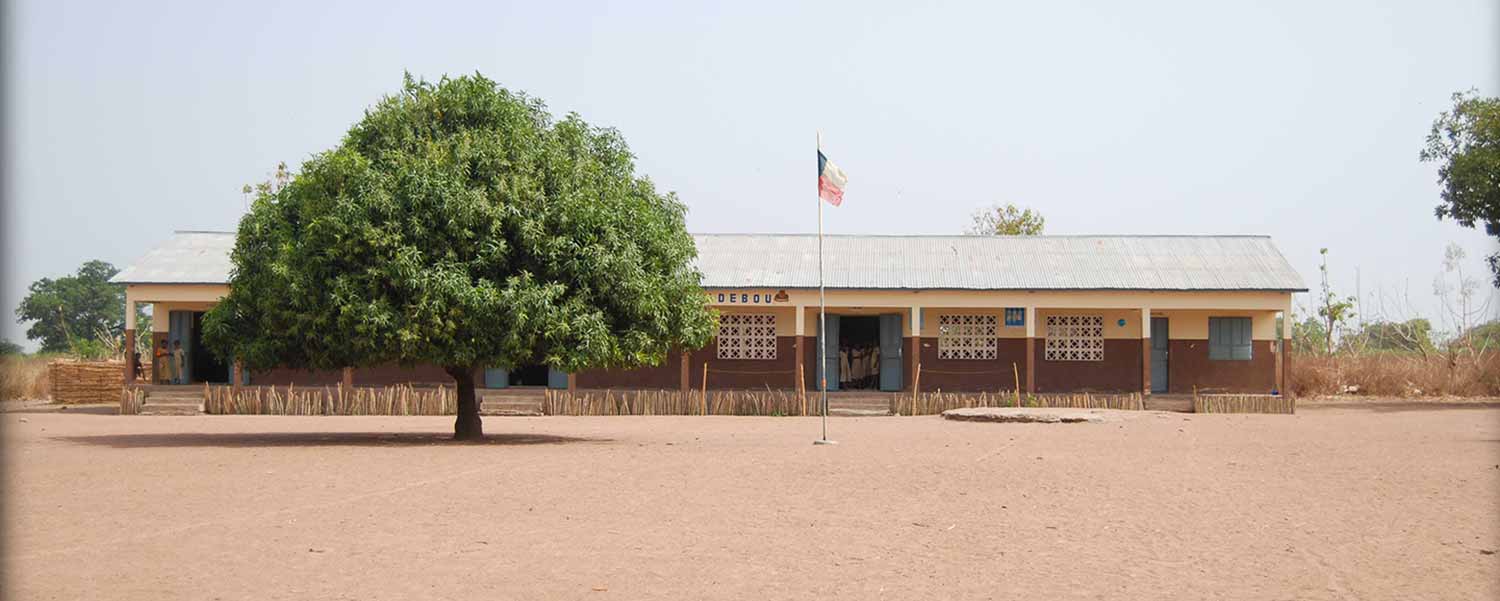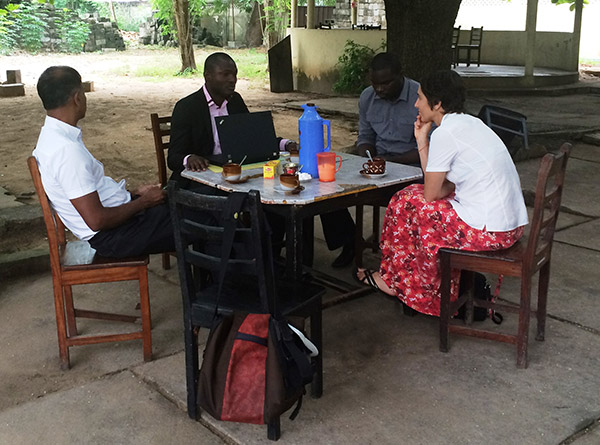
‘Prêt-à-Payer’ App to Directly Fund Secondary Schoolchildren in West Africa
Published Date
By:
- Tiffany Fox
Share This:
Article Content

Photo credit goes to Anna Nazarov.
It only takes about $25 to pay for a single child’s secondary school tuition in Benin. Yet even when that money is available (and for many families, it’s not) a lack of economic infrastructure makes getting the funds to the schools a complicated endeavor.
A new mobile app being designed by researchers at the University of California, San Diego, and Calit2’s Qualcomm Institute (QI) aims to change all that. It provides a way for individuals -- either family members or philanthropists – to send tuition money directly to secondary schools in Benin.

Prêt-à-Payer programmer and QI Principal Design Engineer Ganz Chockalingam (at left), Programmer Analyst Anthony Nwokafor (center right, in gray shirt) and Political Science Assistant Professor Claire Adida (far right) meet with a stakeholder involved in the Prêt-à-Payer project. PDEL and QI sponsored a June trip to Benin for Adida, Nwokafor and Chockalingam, as well as their counterpart Jennifer Burney and QI Project Manager Alexandra Hubenko.
But before the students receive funding for their schooling, the researchers need funding for their research.
The mobile money app is dubbed ‘Prêt-à-Payer,’ which means ‘ready to pay’ and is a play on the French term ‘prêt-à-porter’ (ready to wear). The project is spearheaded by two UC San Diego Assistant Professors, Claire Adida (Political Science) and Jennifer Burney (School of International Relations and Pacific Studies, or IR/PS), and QI Principal Development Engineer Ganz Chockalingam. They are partnering with Benin’s top mobile phone networks to develop the app for the West African nation.
Although the app has received funding support from the Policy Design and Evaluation Lab (a partnership between IR/PS, QI and other on-campus institutions) the team has also initiated a $10,000 crowd-funding campaign to cover the expense of evaluating the pilot program, which will be tested during the 2015-2016 school year. The funds will go toward the fielding of before-and-after surveys among schoolchildren and their families in northeastern Benin to determine whether the technology has made a difference in their lives.
The campaign on the Experiment.com crowd-funding platform has reached approximately one-third of its goal so far, and campaign supporters hope to raise the rest between now and the end of September.
“The problem with secondary schooling in many African democracies is that it is not subsidized by the government the way primary schools have been,” explained Adida. “That leads to low attendance. In Benin, primary school completion is about 35 percent, while completion of secondary school is only five to eight percent.”
Extreme poverty is one of the root causes of the low matriculation rates in Benin. Most rural families rely on agriculture to survive, and the median household income in the country is $1.11 per person per day (the definition of extreme poverty is $1.25 per day). The average cost of sending a child to secondary school – including books and lunch – ranges between $20 and $35 per year. Paying tuition for even one child is a burden for most families in a country where the average household size is 7-8 people.
Subsistence-based households in Benin often rely on child labor to farm fields of cotton and sorghum, which further reduces school enrollment numbers.
“For these families, it’s a question of costs, broadly defined,” added Adida. “Sending children to school is expensive both in terms of fees and in terms of the labor lost working in field. We have some survey data for the region we’re interested in that demonstrates if families had extra money to spend, it would be on food and water, but also on secondary school fees.”
Adida says that among the rural families who do send children to school, many rely on remittances from relatives living in larger cities in Benin or abroad to pay for schooling, but that can cause its own set of problems.
“Families now have to travel in person to remit school fees or they send the money with a taxi driver, who takes a cut,” said IR/PS’s Burney. “The money can often get lost or delayed, and among the few who use the agricultural banks in the area, they can only access it if they show up to the agency in person, and during weekday office hours.”
Yet as poverty-stricken as the nation is, Benin is also a place where mobile phone usage is ubiquitous. An inexpensive phone costs $10, and it is a priority purchase for families and individuals so they can access information such as market prices and stay connected with each other in a region where travel is often prohibitively expensive.
The “Prêt-à-Payer” app is designed for so-called ‘dumbphones,’ as smartphone usage is limited in West Africa due to a lack of Internet connectivity. The app works by way of the user’s mobile phone account. A user keys in a code to transfer funds, selects a recipient school, enters an amount, and then enters the phone number of the child for whom they are paying.
“The nice thing is that each phone’s SIM card is associated with a national identity card,” said Burney. “Both the person funding the student and the student get a receipt that says, ‘This tuition was paid on behalf of Amina Mohammad’, for example.”
Added Adida: “Our technology also has a mechanism for a third-party auditor, which could be the school’s parent association. It increases transparency and accountability, and gives them a way to work with the school administration and ensure that they stick to a budget.”
Adida and Burney, along with a team from QI, traveled to Benin in June to discuss partnerships with the two largest mobile phone companies there, MTN and Moov, as well as with stakeholders on the local school board, the parent-teacher association, students and officials in local and national government.
“Our stakeholders are on board and waiting for our next move, which is to raise funds,” said Adida. The team has applied for additional funding from PDEL and Qualcomm, Inc. to pay for programming fees. PDEL and QI sponsored the June trip to Benin for Adida, Burney and Chockalingam, as well as for QI Project Manager Alexandra Hubenko and Programmer Analyst Anthony Nwokafor.
The app will be available to anyone in the world who wants to sponsor a child in the district. Users can access a list of profiles for households in Benin that are seeking tuition for their children. The pilot will be launched for students in a school district in northeastern Benin called CEG- Kalalé, which serves about 160,000 residents. (The pilot evaluation funded through Experiment.com will track the impact on one high school and 2,000 students in Kalalé.)
“We’re hoping it will provide a structure for a lot of people who are community diaspora members to give back to that part of the world,” said Adida.
Adida says she expects to see enrollment at the primary school increase as secondary school enrollment goes up. “Before, when they knew they couldn’t afford secondary school, they were less likely to bother with even primary school,” she added. “Now students will see there’s a reason to get an education.”
Share This:
You May Also Like
Stay in the Know
Keep up with all the latest from UC San Diego. Subscribe to the newsletter today.


